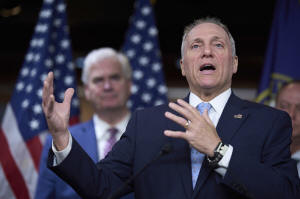Political leaders confront security concerns — and fear — after Kirk's
assassination
[September 15, 2025]
By STEVE PEOPLES and MIKE CATALINI
MORRISTOWN, N.J. (AP) — Even before the killing of Charlie Kirk, Gov.
Josh Shapiro of Pennsylvania was struggling with the emotional toll of
political violence.
In the middle of the night just five months ago, someone broke into his
home and set it on fire. Shapiro, who is also a likely 2028 Democratic
presidential contender, was asleep with his wife and children.
And in the weeks since his family fled the blaze, Shapiro has been
forced to confront the vexing questions now consuming elected officials
in both parties as they face the impact of Kirk's assassination on their
own public lives.
“The emotional challenge for me that’s been the hardest to work through
is that, as a father, the career I chose, that I find great purpose and
meaning in, ended up putting my children’s lives at risk,” Shapiro, a
father of four, told The Associated Press. “Make no mistake, the
emotional burden of being a father through this has been something that
continues to be a challenge for me to this day.”
Across the nation, it is much the same for Republican and Democratic
officials after another stunning act of political violence. Politicians
in both parties and at virtually every level of public service are
suddenly being forced to deal with acute security concerns — and
feelings of grief, anger and fear — as they move deeper into a fraught
election season.
Some political leaders are canceling public appearances. Others are
relying on a large police presence to keep them safe. And still others
insist that the fallout from Kirk’s death won’t have any impact on their
duties.
Indeed, even as Shapiro offered prayers for Kirk's widow and children,
the Democratic governor said he is undeterred in his duties as a leading
figure in his national party and his state.

“I’m not slowing down," he said.
On that, he and President Donald Trump appear to agree.
The Republican president was asked during a Friday appearance on Fox
News if he would cancel any public appearances of his own.
“You have to go forward,” he said.
Violent rhetoric surges
Bellicose rhetoric and even death threats have surged in the days since
Kirk was killed.
"The left is the party of murder," Elon Musk, the tech titan and CEO of
the social media platform X, wrote. “If they won't leave us in peace,
then our choice is to fight or die."
To that, Fox News host Jesse Waters said during a broadcast, “They are
at war with us. Whether we want to accept it or not, they are at war
with us. What are we going to do about it?”
On Friday, a right-wing activist posted online a video outside Illinois
Gov. J.B. Pritzker's home, calling on followers to “take action.”
The charged environment prompted a number of public officials, largely
Democrats, to postpone public appearances.
Sen. Ruben Gallego, D-Ariz., canceled a Saturday town hall in Las Vegas
“out of an abundance of caution for town hall participants, attendees,
and members of the media.” Rep. Alexandria Ocasio-Cortez, D-N.Y., also
postponed a weekend event in North Carolina due to security concerns.
Former Republican Wisconsin Gov. Scott Walker, president of Young
America’s Foundation, which works to attract young people to the GOP,
said his group canceled a Thursday night event in California featuring
conservative commentator Ben Shapiro out of respect for Kirk and his
family.
And while officials in both parties acknowledged that new security
precautions would be in place — for the short term, at least —
cancelations have been rare.

Maryland Gov. Wes Moore, another potential Democratic presidential
prospect who recently announced his 2026 reelection campaign, said he
would not change his public schedule because of the increased threat
even as political violence will be on his mind.
“It’s never something that completely leaves you, but I don’t think it
can be something that debilitates you," Moore told The Associated Press.
When asked if he expects a retaliatory attack against Democrats, the
former Army captain insisted, "We are not at war with one another.”
[to top of second column]
|

House Majority Leader Steve Scalise, R-La., speaks during a news
conference at the Capitol in Washington, June 4, 2025. (AP Photo/J.
Scott Applewhite, File)

“As someone who has seen war, as someone who knows what war looks
like, as someone who will live with the realities of war for the
rest of my life, I refuse to ever believe that we in the country are
at war with one another," he said. "And I refuse to believe that
that we as a country are devolving into some just kind of type of
retaliatory tit for tat.”
“Resorting to violence is a remarkable sign of weakness," Moore
added. “It means you can’t win a political argument.”
And yet political violence is becoming more frequent in the United
States.
Former Democratic Rep. Gabby Giffords was shot in the head as she
met with constituents in 2011. Republican Rep. Steve Scalise was
shot at a congressional team baseball practice in 2017. Trump was
grazed by a bullet last summer on the stump in Pennsylvania. And
barely three months ago, the top Democrat in the Minnesota state
house and her husband were gunned down at home.
What it looks like on the campaign trail
Several uniformed police officers stood side by side along the
entrance of a public park where the Democratic candidate for New
Jersey governor, Mikie Sherrill, met voters Friday to discuss
measures designed to bring transparency to the state budget process.
The significant security presence was a sharp shift from Sherrill's
recent events.
In Illinois, Republican candidate for lieutenant governor, Aaron Del
Mar, said he and other GOP candidates are discussing new security
precautions, such as bringing events indoors, enhanced use of metal
detectors and background checks on those who attend their events.
“There’s a lot of concern right now,” he said.
Back in New Jersey, 35-year-old Democrat Maira Barbosa attended
Sherrill's event with her 16-month-old son. She said she's never
been more resolved to show up to a political event in person, even
as she admitted she had second thoughts.
“We’re seeing so much hate speech and we’re seeing people advocate
for violence, so of course it makes me concerned, especially to the
point of bringing my son,” she said. “If we don’t participate, if we
don’t get involved, who is going to represent us?"

Top Democratic governors speak out
In interviews, governors Shapiro and Moore largely avoided casting
blame for the current era of political violence, although they were
critical of Trump's immediate response to Kirk's shooting.
The Republican president highlighted only attacks against
Republicans during his Oval Office address on Thursday and blamed
“the radical left” for Kirk's shooting, even before the suspect was
arrested.
Shapiro said Trump “misused the power of an Oval Office address."
“To be clear, the political violence has impacted Democrats and
Republicans, and the rhetoric of vengeance and the language that has
created division has come from both sides of the political divide,”
Shapiro said. “No one party has clean hands, and no one party is
immune from the threat of political violence.”
Moore called for everyone to tone down the rhetoric.
“I just think it’s important for the president and anyone else to
understand that your words matter, and leadership is how you lift us
up in darkness, not how you use it as a moment for opportunism and
to introduce more darkness and finger pointing into into an already
horrific situation,” he said.
“I’m praying for our country," Moore continued. "I’m praying that
the legacy of this moment is we got better — not that we got worse.”
___
Associated Press writers Sejal Govindarao in Phoenix; Laura Bargfeld
in Chicago; Chris Megerian in Washington; and Scott Bauer in
Madison, Wisconsin, contributed.
All contents © copyright 2025 Associated Press. All rights reserved |